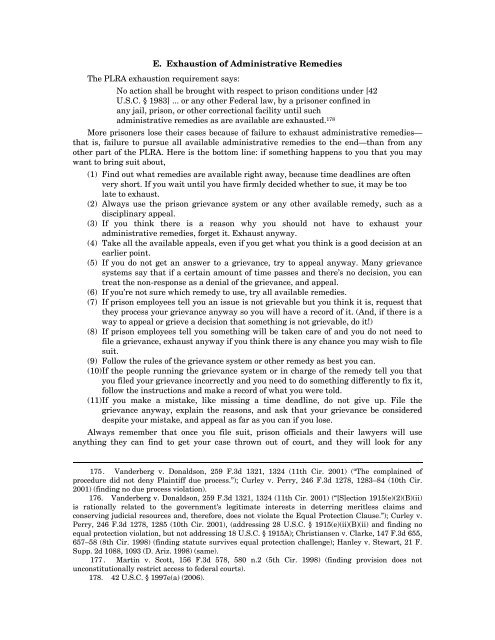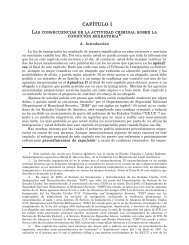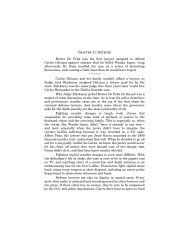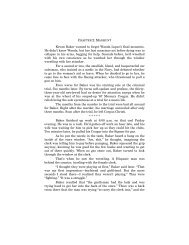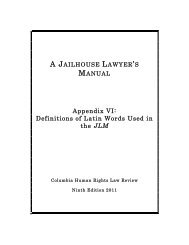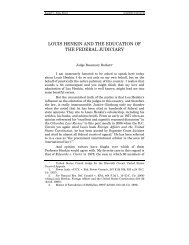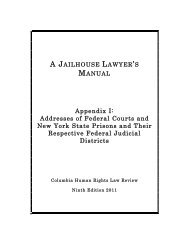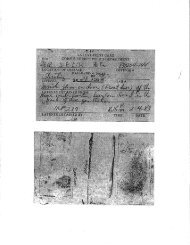A Jailhouse Lawyer's Manual Chapter 14 - Columbia Law School
A Jailhouse Lawyer's Manual Chapter 14 - Columbia Law School
A Jailhouse Lawyer's Manual Chapter 14 - Columbia Law School
You also want an ePaper? Increase the reach of your titles
YUMPU automatically turns print PDFs into web optimized ePapers that Google loves.
E. Exhaustion of Administrative Remedies<br />
The PLRA exhaustion requirement says:<br />
No action shall be brought with respect to prison conditions under [42<br />
U.S.C. § 1983] ... or any other Federal law, by a prisoner confined in<br />
any jail, prison, or other correctional facility until such<br />
administrative remedies as are available are exhausted. 178<br />
More prisoners lose their cases because of failure to exhaust administrative remedies—<br />
that is, failure to pursue all available administrative remedies to the end—than from any<br />
other part of the PLRA. Here is the bottom line: if something happens to you that you may<br />
want to bring suit about,<br />
(1) Find out what remedies are available right away, because time deadlines are often<br />
very short. If you wait until you have firmly decided whether to sue, it may be too<br />
late to exhaust.<br />
(2) Always use the prison grievance system or any other available remedy, such as a<br />
disciplinary appeal.<br />
(3) If you think there is a reason why you should not have to exhaust your<br />
administrative remedies, forget it. Exhaust anyway.<br />
(4) Take all the available appeals, even if you get what you think is a good decision at an<br />
earlier point.<br />
(5) If you do not get an answer to a grievance, try to appeal anyway. Many grievance<br />
systems say that if a certain amount of time passes and there’s no decision, you can<br />
treat the non-response as a denial of the grievance, and appeal.<br />
(6) If you’re not sure which remedy to use, try all available remedies.<br />
(7) If prison employees tell you an issue is not grievable but you think it is, request that<br />
they process your grievance anyway so you will have a record of it. (And, if there is a<br />
way to appeal or grieve a decision that something is not grievable, do it!)<br />
(8) If prison employees tell you something will be taken care of and you do not need to<br />
file a grievance, exhaust anyway if you think there is any chance you may wish to file<br />
suit.<br />
(9) Follow the rules of the grievance system or other remedy as best you can.<br />
(10) If the people running the grievance system or in charge of the remedy tell you that<br />
you filed your grievance incorrectly and you need to do something differently to fix it,<br />
follow the instructions and make a record of what you were told.<br />
(11) If you make a mistake, like missing a time deadline, do not give up. File the<br />
grievance anyway, explain the reasons, and ask that your grievance be considered<br />
despite your mistake, and appeal as far as you can if you lose.<br />
Always remember that once you file suit, prison officials and their lawyers will use<br />
anything they can find to get your case thrown out of court, and they will look for any<br />
175. Vanderberg v. Donaldson, 259 F.3d 1321, 1324 (11th Cir. 2001) (“The complained of<br />
procedure did not deny Plaintiff due process.”); Curley v. Perry, 246 F.3d 1278, 1283–84 (10th Cir.<br />
2001) (finding no due process violation).<br />
176. Vanderberg v. Donaldson, 259 F.3d 1321, 1324 (11th Cir. 2001) (“[S]ection 1915(e)(2)(B)(ii)<br />
is rationally related to the government's legitimate interests in deterring meritless claims and<br />
conserving judicial resources and, therefore, does not violate the Equal Protection Clause.”); Curley v.<br />
Perry, 246 F.3d 1278, 1285 (10th Cir. 2001), (addressing 28 U.S.C. § 1915(e)(ii)(B)(ii) and finding no<br />
equal protection violation, but not addressing 18 U.S.C. § 1915A); Christiansen v. Clarke, <strong>14</strong>7 F.3d 655,<br />
657–58 (8th Cir. 1998) (finding statute survives equal protection challenge); Hanley v. Stewart, 21 F.<br />
Supp. 2d 1088, 1093 (D. Ariz. 1998) (same).<br />
177 . Martin v. Scott, 156 F.3d 578, 580 n.2 (5th Cir. 1998) (finding provision does not<br />
unconstitutionally restrict access to federal courts).<br />
178. 42 U.S.C. § 1997e(a) (2006).


